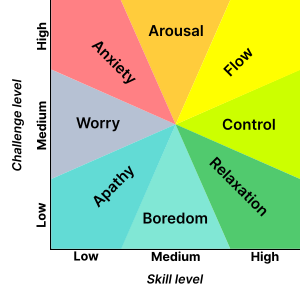Getting what you want is the essence of leadership, and that is what I want to talk about in this article. I wrote it for my partner Lena when we had some difficult conflict to resolve. I thought it might be useful for other people.
But before I get to what to do, I want to say what not to do.
Don’t complain.
 Complaining is unhelpful because the complainer wants others to solve the problem. When you are having conflict that does not feel productive, it is often because one or more parties are complaining, wishing others would solve the problem for them.
Complaining is unhelpful because the complainer wants others to solve the problem. When you are having conflict that does not feel productive, it is often because one or more parties are complaining, wishing others would solve the problem for them.
Complaining also contains the wisdom of communication – since the complainer is trying to communicate with others to get resolution. Complaining often has the spirit of anger, another wise quality, since anger can help motivate people to work for change. Since the anger is directed at other people, though, it is not an optimal problem-solving strategy. Anger is helpful when directed at problems or situations.
Don’t avoid or attack.
Avoiding is another well-used but unhelpful problem-solving strategy. The main thrust of avoiding is the hope that someone else will solve the problem or that it will go away by itself. This rarely happens.
Avoidance’s wisdom is in self-control – carefully considering a course of action is known to be helpful, while taking rash action often leads to suboptimal solutions or even disaster. Too much inaction, though, causes problems.
While avoiding is passive-aggressive, attacking is directly aggressive. It’s suboptimal because it is about stopping action via non-rational means.
The wisdom in an attack is that of engagement with another person or idea. It’s best to engage using rational means, as non-rational engagements can often cause damage.
Don’t fall into self-pity.
Self-pity is similar to complaining, except that the subject of the complaints is oneself. This unproductive strategy is designed to get other people to solve the problem, or to solve the psychological problem of explaining to oneself why the problem exists. It is a cross between complaining and avoiding – since the complaints are directed at oneself, but no productive action is being taken to solve the outward problem.

Self-pity’s seed of wisdom comes in recognizing ones’ own part in creating problems – I find that solving difficult problems often requires changes in my own views or behaviors. Here too it is taken to an unhelpful extreme: by complaining, you reinforce the counterproductive view that you are not capable of solving the problem yourself.
Each of these anti-patterns does contain wisdom: all are based in recognition of a problem. Without recognition there can be no solution. But once you have recognition, it’s best to use strategies that are known to be helpful
So how do you get what you want? The first step is recognizing these anti-patterns in yourself, if they occur. It’s also helpful to recognize them in others so that ones’ team can name them in a non-judgmental way, and begin to learn healthy and constructive patterns of leadership.
Do take care of yourself.
In other words, stay rational. In terms of the Core Protocols, this means keeping the Core Commitments. To solve problems effectively, by yourself or with others, you need to be in a rational state of mind. If you can’t be rational, you won’t be able to be productive. The Core Protocol that is relevant is Check Out: to remove yourself from situations if you notice that you or others are irrational, returning when you and others are rational.
It may seem odd that that the first road to getting what you want is to leave, but I and others like John Gottman have found that Checking Out – minimizing flooding – is an effective problem-solving strategy. Things that are easy to solve in a rational state of mind are hard or even impossible to solve when one or more people have their minds clouded by strong emotions. This is just part of being human, but it is one of the hardest roads to follow.
Do ask for help.
You are not alone. Often when faced with problems, people try to solve them alone. One of the Core Commitments is, “Use teams to solve hard problems.” Problems that are hard for one person to solve might be easy for two. Or it might require a few more – but simply by working with others often leads to quick resolution. This is true because other people have other viewpoints, other resources, and other emotional responses.

To ask someone for help, simply say, “Will you help me?” This is the clearest way to ask someone, since it recognizes that they may say no. The Ask For Help protocol has more details.
Do investigate yourself and other people.
Every successful problem solver starts with “I don’t know.” The next obvious step is to learn more. How do you do that? Investigate Protocol is good if you want to know lies with yourself, someone else, or if you simply don’t know where to start.
Often the solution to a problem can be found within yourself. Simply find someone, and ask them to help by investigating you as a detached but fascinated observer would – telling someone your problems can help you realize the right course of action. The Investigate Protocol explains how to do this.
If you think clues about the solution might lie in someone else, you can ask them for help and investigate them.
If you don’t know where to start, having someone investigate you is helpful because by telling the problem to others helps generate ideas. How many times have you asked someone for help, began telling them about it, and then realized the solution?
Do create new solutions.
The best way out of a problem is often to invent something new. This requires imagination and creativity. Simply use your natural talents until you come to the solution, or until you encounter another problem that is blocking you from solving your main problem. You can do this alone, or with a small group of people.

You can create even when you know you can’t create a good solution by yourself: once you have a proposed solution, even if it is unworkable, you can get other people to help improve it. It is much easier to improve an existing solution then create one to begin with.
Creating is the only one of these “Do”s that does not have a Protocol associated with it.
Do improve existing solutions.
It’s much easier to improve something than to create it. So what is the best way of improving a proposed solution? The Perfection Game Protocol provides a structured, non-violent way to give this feedback: First, you rate the work product from 1-10, 10 being best. This is a measure of how much improvement you think you can make, a 5 means you can double it, 3 means you can more than triple it, 1 means you can make it 10x better. If you can’t think of any improvement you must rate it a 10. Then you say what you like, and finish by giving concrete suggestions for what it will take to make it a 10.
You must limit yourself to positive statements that actually improve the work. In this way people can receive the feedback optimally, and then decide on their own what suggestions to use or discard. This is a non-violent technique since there is no criticism or negative statements.
Do listen deeply to other people.
Truly hearing someone else is often enough to solve intractable problems with other people. Listen Protocol provides a structured, non-violent way for two people to deeply understand each other.  This is done by having one party state their concerns, one sentence, idea, or feeling at a time. Then the other party repeats back what they said. In this way the speaker can know the listener truly understands what they are saying. You can use a coach to help both parties keep to the structure.
This is done by having one party state their concerns, one sentence, idea, or feeling at a time. Then the other party repeats back what they said. In this way the speaker can know the listener truly understands what they are saying. You can use a coach to help both parties keep to the structure.
Often when the emotions behind a conflict are deeply understood by all involved, the solution to a conflict will become clear too.
Do make effective decisions.
Decide first, don’t discuss. This is because everyone may already agree with you, and if so, discussing wastes time and energy. If they don’t agree with you, when you decide you can find out exactly what is preventing you from getting what you want.
Discussion is a natural part of human society, and can be quite fun and fulfilling. In team behavior, however, discussion is an anti-pattern, because it does not lead toward action. If you want to achieve a goal (getting what you want) you need to get a group of people to move toward it. Discussion does not do that. The way groups keep their actions aligned in the same direction is by making great decisions.
The Decider Protocol, and its companion, Resolution Protocol, provides a way for a small group (less than 7) people to make good decisions quickly. Why is speed important? Greatness is simply the abundance of goodness. If you can make good decisions quickly, you create an abundance of them. The Marine Warfighting Manual has this to say:
Time is a critical factor in effective decisionmaking—often the most important factor. A key part of effective decisionmaking is realizing how much decision time is available and making the most of that time. In general, whoever can make and implement decisions consistently faster gains a tremendous, often decisive advantage.
Conclusion
I have found these rules of thumb to be fast and effective ways to get what you want. Since getting what you want is a key leadership skill, mastering these techniques is a good way to increase your capabilities as a leader in all the realms of human life: self, family, friends, work, and society.
There are several points that I did not cover in this article. The first is how to get a group of people to want the same thing (shared vision). Another is, once they want the same thing, what is the fastest way to get them to practice the behaviors described in this article? I will cover these in a later article.
Thanks to Jim and Michele McCarthy for significant help improving this article. Thanks to Lena McCullough for helping with the pictures.










 This is done by having one party state their concerns, one sentence, idea, or feeling at a time. Then the other party repeats back what they said. In this way the speaker can know the listener truly understands what they are saying. You can use a coach to help both parties keep to the structure.
This is done by having one party state their concerns, one sentence, idea, or feeling at a time. Then the other party repeats back what they said. In this way the speaker can know the listener truly understands what they are saying. You can use a coach to help both parties keep to the structure.